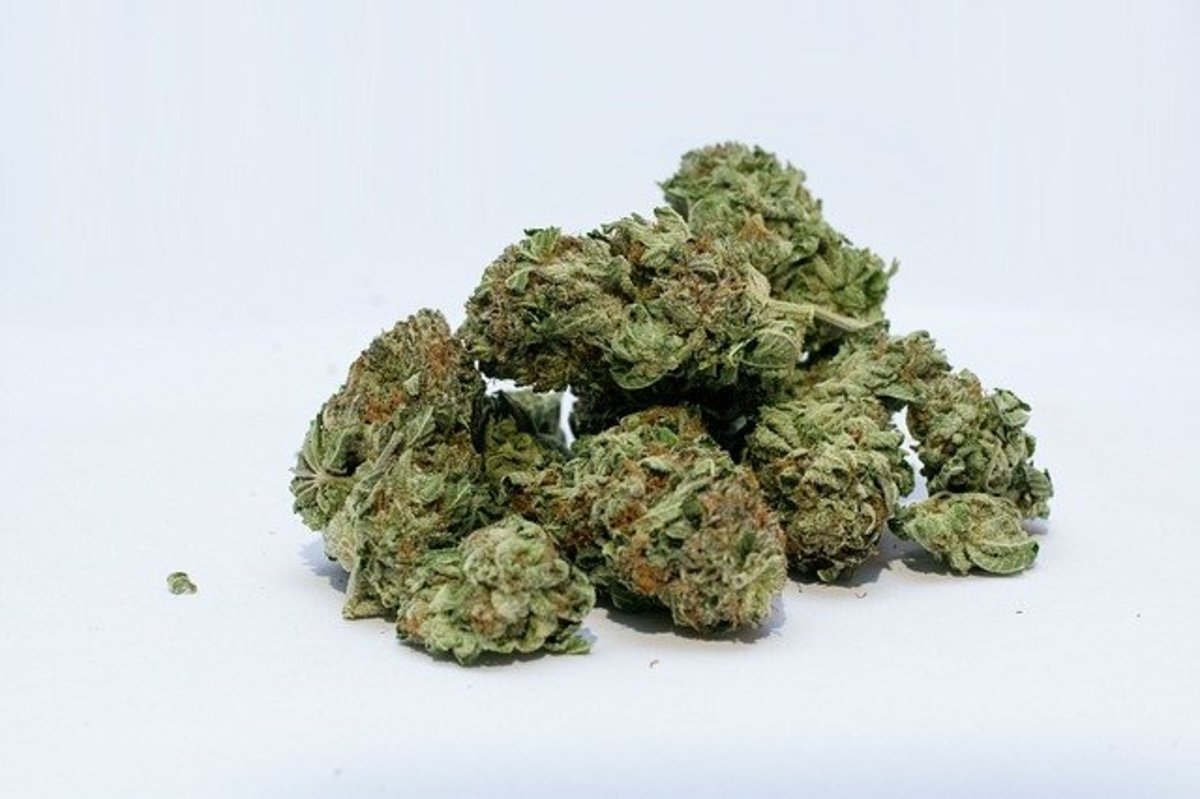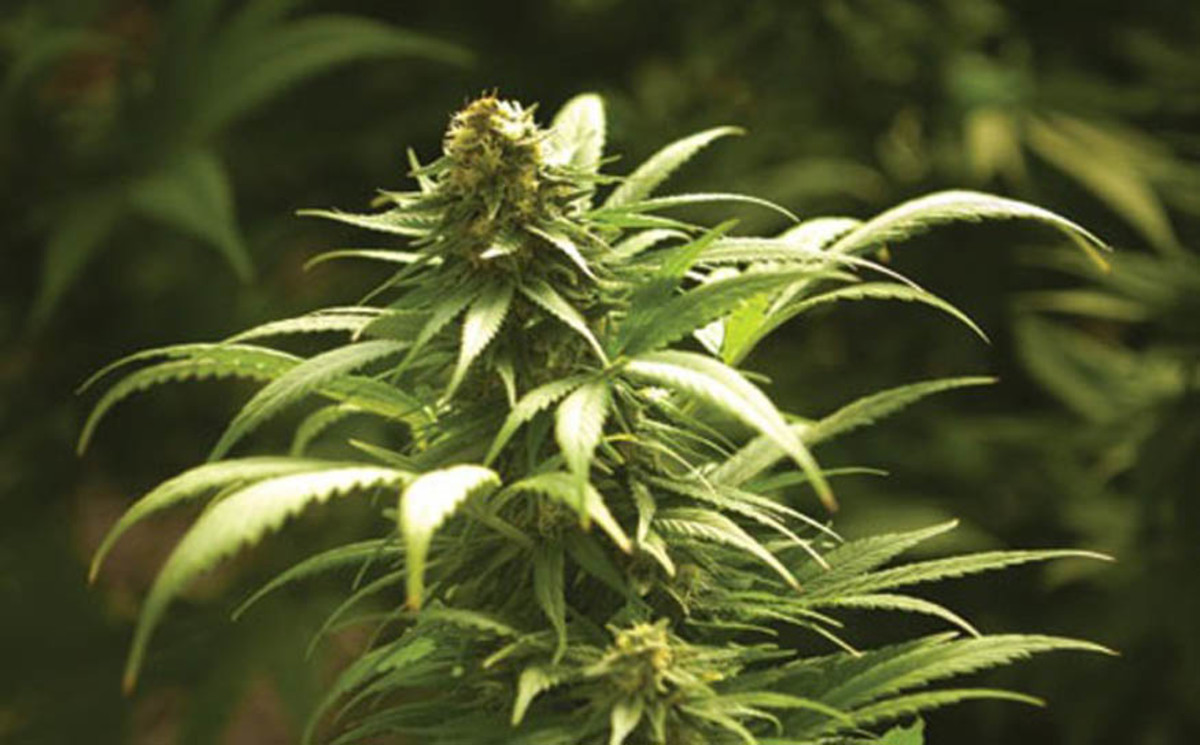Why Pot is Illegal
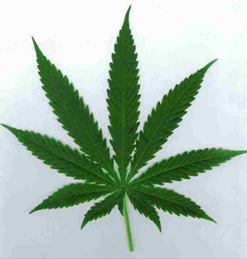
I don't smoke pot. Sure, I tried it a few times back in the day, but it wasn't my cup of tea. I'm more of a chrystal meth kinda guy. (I'm also really into facetiousness) Regardless, I firmly believe it should be legalized (the pot, not the meth). Before I get into the particulars of why that is, let's step back in time and discover why cannabis was made illegal in the first place.
The Cannabis sativi L plant species is found in abundant supply all over the world, mostly notably in 2 distinct forms: hemp (found all over North America), and marijuana (relegated mostly to Mexico). The primary difference between the 2 plants is the level of tetrahydrocannabinol (THC), the ingredient that causes the high. Marijuana contains as much as 20% THC, while hemp contains less than 1%. Hemp was found to have an abundance of extraordinary uses, such as the manufacturing of textiles, rope, paper, clothing, boat sails, animal bedding, garden mulch, fuel, and an assortment of building materials. But it wasn't just versatile, it was usually much stronger and more durable than its counterparts. Hemp was widely used throughout the American Colonies and States after King James I - the same of the Bible bearing his name - ordered the Colonies in 1611 to begin widely producing it to help bolster the English economy. George Washington and Thomas Jefferson both grew hemp. The Declaration of Independence was written on hemp paper. But although this plant was extremely useful, it was also extremely difficult to extract from the stalk, for which process prison labor, and eventually slave labor were employed. The Emancipation Proclamation, under President Lincoln, abolished slavery in 1865, resulting in a dramatic decrease in the production of hemp products. Hemp was on a temporary, semi-hiatus, until the invention in 1935 of the decordicator, a machine of such revolutionary magnitude as the printing press, the cotton gin, and the combustion engine. The decordicator allowed for the processing of hemp at a production level that could compete with the cotton, wool, wood, and petroleum industries. It could create a higher quality product at a much lower price. Obviously, this was completely unacceptable to the big corporations it was set to compete with, and 4 major players in particular took immediate action: DuPont, Andrew Mellon, William Randolph Hearst, and Harry Anslinger
Mr. DuPont had just gotten a patent in the wood paper pulp industry, and was working on another for nylon and rayon. Had hemp remained legal, DuPont would most likely not have achieved its current standing as the world's second largest chemical company.
Andrew Mellon (of Mellon Bank) was Mr. DuPont's financier. The only two times the DuPont company ever borrowed money from Mellon Bank, Andrew Mellon was the Secretary of the Treasury at the time.
William Randolph Hearst had vast holdings in the wood paper pulp business. He is credited with coining the word "marijuana" to describe the Mexican variation of the cannabis plant that got people so high, then slapping that same label on the hemp variation of cannabis to generate confusion, and then spending ten years trying to convince the American people they were the same evil thing and must be destroyed. (Part of his new found hatred and racism for all things Mexican-related stemmed from the recent confiscation of 8,000,000 acres of Hearst's land in Mexico under Poncho Villa.) Hearst also owned the San Francisco Examiner, a wildly sensationalist publication, and the New York Morning Journal. He used them to run headlines like, "Marijuana Makes Fiends of Boys In 30 Days," "Hasheesh Goads Users To Blood Lust," and "New Dope Lure, Marijuana, Has Many Victims." They published propaganda fliers like the following:
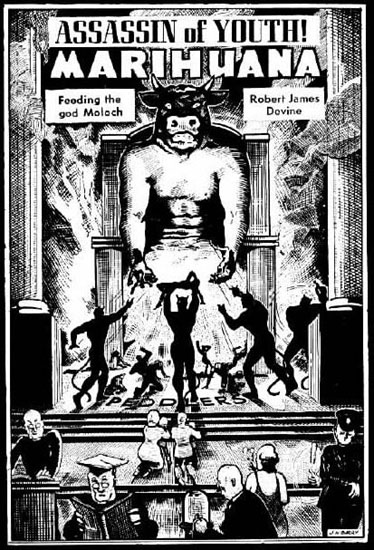
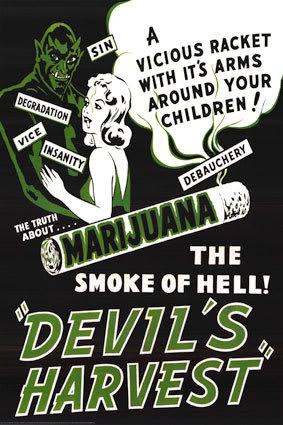
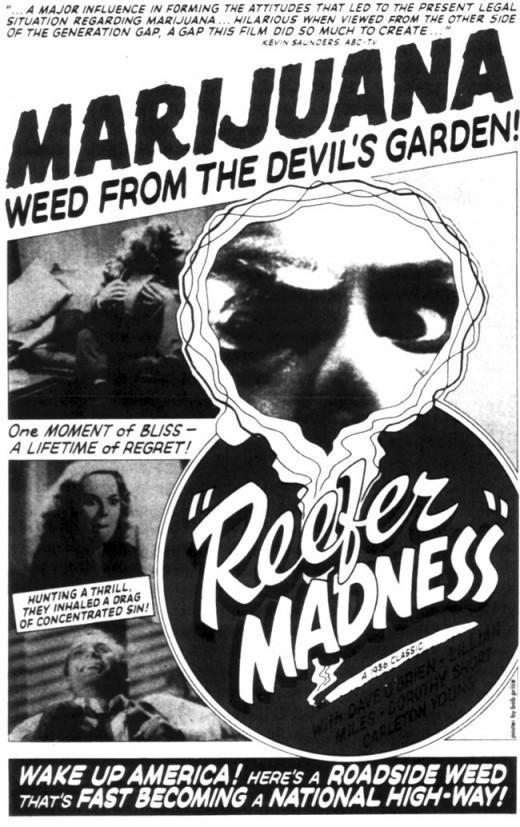
Harry Anslinger was Mellon's nephew-in-law, and was the drug czar at the time. When Congress formed the Federal Bureau of Narcotics (FBN) in 1930 - a department of The Secretary of the Treasury - Mellon made him head of the department, a position he held for 31 years until John F. Kennedy finally canned him because he was so crooked and rotten. When the FBN's budget was cut by $200,000, Anslinger decided to introduce a new drug "menace," and tried to get Congress to pass the 1937 Marijuana Tax Act, which would require tax stamps on all marijuana transaction (though he planned not to actually issue any of these stamps).
All sorts of unverified claims from non-medical sources began pouring in, recounting how schoolchildren were keeling over dead in their tracks by the truckloads from their brief contact with marijuana. The American Medical Association (AMA) soundly rejected all these dubious assertions, and instead argued that marijuana had actually been used for decades to heal and treat an assortment of various maladies, from rheumatism to palsy to neuralgia to epilepsy. (Today, it is also used medicinally to treat migraines, multiple sclerosis, glaucoma, high blood pressure, nausea induced by cancer and chemotherapy, seizures, tourettes, PMS, OCD, ADD and ADHD, Chrohn's disease, and Alzheimers, to name just a few.) Nonetheless, the bill was railroaded through, not because of any substantiated health concerns, but because some greedy corporate talking heads didn't want to have to compete with a superior product.
That's pretty much where we are today, only now, Big Pharmaceutical, Big Alcohol, and Big Tobacco have joined in the fray. Marijuana can treat (often far more effectively and cheaply) a number of maladies that synthetic drugs currently own the market on. The pharmaceutical industry would stand to lose billions if marijuana were legalized. Alcohol doesn't want to compete either. You know all those anti-marijuana commercials out now...the ones with the lonely boy sitting on his parents' basement couch, wondering where all his friends went; or the one with the girl whose dog talks to her, asking her why she never plays with him anymore? That entire add campaign is sponsored by Partnership For A Drug-Free America, whose financiers are, drum roll please..............the alcohol industry! None of them are the least bit concerned over the possible health hazards posed to the American people, they're just worried about their potential profit loss.
Here are some interesting statistics for you about the number of deaths in the United States in a typical year:
- Tobacco kills about 400,000
- Alcohol kills about 80,000
- Workplace accidents kill 60,000
- Automobiles kill 40,000
- Cocaine kills about 2,500
- Heroin kills about 2,000
- Aspirin kills about 2,000
- Marijuana kills 0
There has never been a recorded death due to marijuana at any time in US history. All illegal drugs combined kill under 20,000 per year, or a small percent of the number killed by alcohol and tobacco. Tobacco kills more people each year than all of the people killed by all of the illegal drugs in the last one hundred years. So why are tobacco and alcohol legal while marijuana is not? Because they have hundreds of millions to spend on lobbyists in
Washington to ensure lawmakers are going to continue to remain in their pockets. That, my friends, is why marijuana is illegal. Not because it kills (it's actually impossible to O.D. on cannabis), not because it's anymore harmful than alcohol or cigarettes (if you don't want the ill health effects of smoking it, you also have the options of vapor inhalation or oral ingestion), not because of its inherent ability to impair judgment (which alcohol does far worse), but because of simple, unadulterated greed and corruption. Put that in your pipe and smoke it!

